Tom Hardwidge, Tall Story Games interview – Lucy Dreaming
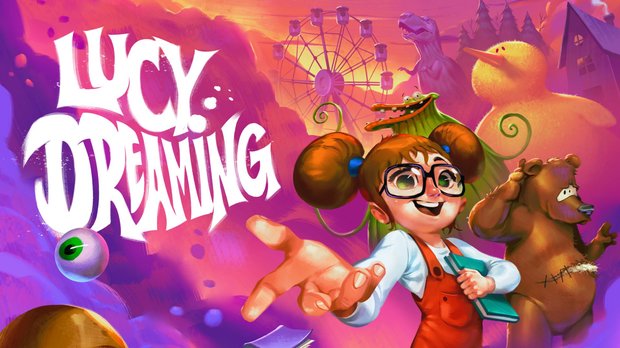
- 0 Comments
Ever had a dream so vivid, you were sure at the time it was real? Well, the eponymous star of Tall Story Games' upcoming Lucy Dreaming sure has. Young Lucy is having nightmares, and to put an end to them she'll not only need to deal with her highly dysfunctional family in the real world, she'll also need to venture inside her own dreams to get to the bottom of why they're happening.
If she'd only asked me, I could have told her why they're happening: Tom Hardwidge. Lucy Dreaming is Tom's first commercial adventure after several well-received freeware titles, and with the game due to release early next week, I nabbed the indie British developer to chat about his upcoming point-and-click comedy adventure inspired by the genre classics of the 90s.
So, poor Lucy is having bad dreams. What exactly is troubling the young woman?
The opening cutscene of the game (and indeed the demo) shows Lucy plummeting through the air at over twenty miles per hour. This recurring nightmare has been plaguing her for over a decade and, when she wakes, she finally decides enough is enough, and it’s time to get to the bottom of her affliction once and for all.
Along the way, we discover that life in her home town of Figgington is not particularly pleasant, especially as she has to share a house with her maniacal twin brother, Lloyd, who enjoys nothing more than experimenting on Lucy’s toys.
As to the disturbing truth at the root of her nightmares? That’s the ultimate question that can only be answered by playing the game.
Lucy Dreaming is divided into exploration of the real world and the dream world. What would you estimate is the percentage of time spent in each?
It’s pretty evenly weighted. I’ve never actually timed them independently but, if I had to estimate, I’d say it’s probably around 55% dreams to 45% reality.
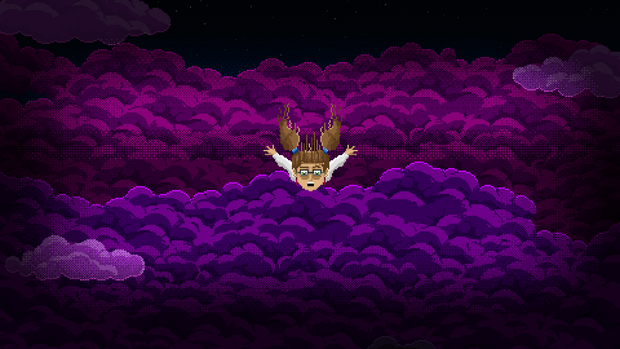
As with any point-and-click adventure, this depends on how quickly the player solves individual puzzles. I can think of one point in the game where many of our beta testers found themselves pondering the solution. During testing I would often wake to three messages from a tester. The first would read, “I’m stuck! How do I xxxxx?” The next message would typically be sent within 20 minutes of the first and would say something like, “Got it!” And the third would say, “That puzzle was hard, but I think it’s my favourite.” For me, that’s the best indication that it was pitched at the right level of difficulty, just hard enough to stop players in their tracks, but more satisfying to solve because of it. It was also the puzzle I was most worried about whilst developing the game.
Setting a story in the land of dreams opens a world of possibilities limited only by imagination. What sorts of surprises have you got cooked up for players in Lucy’s subconscious?
Anyone who follows me on social media will have seen some of the scenes and characters being created along the way. I’ve tried to steer clear of too many well-trodden themes (like pirates, space, fairy tales, etc.) in favour of dream-like situations inspired by real life, as dreams often are.
Early in the game, Lucy discovers a method to control her dreams. This is the mechanic that allows her to dream-hop throughout the game to solve puzzles and unearth hidden memories. It is fueled by “inspiration” and, early on, I imagined this would take the form of storybooks. This train of thought led me to consider “if a dream can be inspired by a child’s story, why not a marketing pamphlet, a newspaper or a school textbook?” – a leap which made it easier to create more original dream worlds.
As a designer, how do you balance the need for intuitive gameplay with an anything-goes mentality that a dream world affords?
It comes down to logic. I believe that, even if the context is unfamiliar and outlandish, the mechanics and solution to any puzzle can be intuitive if the necessary clues are provided.

With the burden of knowing so many adventure game tropes myself, it is doubly hard to test for the dreaded “moon logic” in my own games. It’s not good enough to expect people to solve a puzzle purely because it’s there (although many seasoned adventure game fans will instinctively do so). I learned this the hard way with the demo. I was trying to be careful to leave a breadcrumb trail around all the puzzles, but I still missed a vital link in one of the chains. It had never come up in the hundreds of times I saw the demo being played because people were instinctively drawn to the puzzle and, as it’s an adventure game, solved it because it was there to be solved. When it was pointed out to me that there’s no actual reason to complete that puzzle, I was floored. It was so obvious, and I’d missed it. This was a valuable lesson and I have been through all the puzzles in the full game to ensure that it doesn’t happen again (I hope).
Despite its rather serious-sounding premise, Lucy Dreaming is very much a comedic game that has what you’ve referred to as “a witty British sense of humour inspired by the likes of Blackadder and Monty Python.” How would you define what makes the humour in your game distinctly “British” in a way that other games are not?
For me, it’s down to the choice of words. In shows like Blackadder and Red Dwarf, much of the humour comes from the colourful, over-the-top descriptions; using twenty syllables where five would have been sufficient. Add to that a bucket load of sarcasm and a sardonic delivery, and it very quickly takes on a distinctly British feel. I absolutely adore the way authors like Roald Dahl played with words and coined new ones to suit their needs. You only have to listen to Willy Wonka or the BFG speaking to hear a vocabulary that is not only unique, but utterly understandable. That has undoubtedly influenced my own writing.
The game is clearly inspired by the retro classic adventures. What are some of your favourites, and were any of them a particular influence on you as a designer?
The first point-and-click adventure game I played was Sierra’s King’s Quest IV. It will always have a special place in my heart along with Leisure Suit Larry, Police Quest and the rest of the King’s Quest titles, but in terms of influences on Lucy Dreaming, it’s LucasArts all the way. The Secret of Monkey Island and Monkey Island 2: LeChuck’s Revenge are two of my all-time favourite games, with the latter just sneaking ahead (mainly because it was the first adventure game I completed on my own with no help or walkthroughs). Whether intentionally or not, much of my own game and puzzle design is inspired by the LucasArts classics, and I’m sure that many players will spot the foundations of these puzzles shining through in Lucy Dreaming.
I chose a pixel art style for a couple of reasons. Firstly because my old, nostalgic brain seems to have fused that aesthetic to point-and-click gameplay in a way I find deeply satisfying. Secondly, low-resolution pixel art has practical advantages in terms of the overall game size, and the speed at which I can draw it. I absolutely adore the style of Return to Monkey Island, but it is way out of my league as an artist.
You’ve opted for a kind of pared-down SCUMM-style verb interface for Lucy Dreaming. Why go that route instead of a more streamlined control scheme?
I never really considered any other kind, probably because a SCUMM-style interface is what I grew up enjoying the most. That said, I have also stuck with it because it lends itself so well to touchscreen devices. I managed to get fully working ports of the demo on Android and iOS devices within just a few hours because the main interface is visible 100% of the time. There’s no hidden inventory or right-click commands to accommodate; all it requires is pointing and clicking (well, tapping).
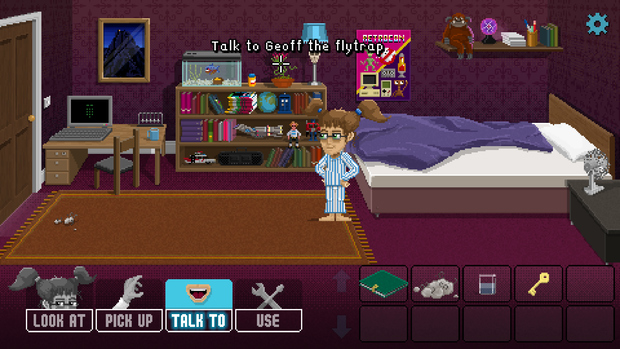
What kinds of challenges should players expect from the game, and are they different depending on whether they occur in the real or dream worlds?
You’ll find a range of different puzzles including fetch quests, item combinations, dialogue, timing, music and a bit of lateral thinking. One thing I love in adventure games is parallel situations influencing each other, like time travelling in Day of the Tentacle. I have introduced a similar mechanic into a couple of my shorter adventure games, but in Lucy Dreaming I was able to push this even further to create puzzles that bridge the gap between the real world and Lucy’s subconscious.
You rather astutely (if entirely coincidentally) brought Dominic Armato (voice of Guybrush Threepwood) on board as a voice actor just before he was thrust back into mainstream prominence in Return to Monkey Island. Good choice! What role does Dominic play in the game?
Anyone who follows Dominic on Instagram will know that his real passion is food and, when he’s not swashing buckles, he can be found critiquing eateries in his hometown of Phoenix, Arizona. We wanted to write a role for him that not only paid homage to his career as a dining critic, but also made use of the fact that he was an American in a small British town as the basis for his backstory, and some of the puzzles his character is involved in.
We wanted to work with Dominic from the beginning and, as soon as we had surpassed our initial voiceover stretch goal on Kickstarter, I contacted him to see if he was interested. He got back to me quickly with a definite “yes” but with the caveat that all the appropriate union paperwork for the Screen Actors’ Guild needed to be filled in and above board. That sounded simple enough, so we started working our way through it. It is not a simple process. Each form seems to lead to another two forms in a fractal tree of red tape. A year later we were still working through the details of US payroll when Return to Monkey Island was announced. I immediately contacted Dom again to both congratulate him, and to ensure we were still good to proceed. He assured us he was still on board (after all, we had asked him before Ron Gilbert had) and we worked our way through the last few forms before recording.
Children are notoriously difficult for adult voice actors to get right. Who have you got playing Lucy?
A bit like Stewie from Family Guy, we didn’t want an overly childish voice for Lucy. The intention wasn’t to have a voiced game originally, but on a whim I decided to ask a couple of actors to record sample lines for Lucy. Immediately, the voices lifted her character to another level and I knew it was going to be hard to go back to a text-only game.
I try to put a lot of detail into each scene, both in the number of interactive hotspots available and the custom responses for each one; there’s nothing worse than being blocked by a “that doesn’t work” response at every turn. The unfortunate result of this is that the lines of text quickly mount up (there are over 11,000 lines in the full game). They all need to be translated and, in most cases, recorded by a voice actor, meaning that all the costs were (understandably) prohibitively high.
At this point, we decided to disregard the idea of voicing the game completely until, one evening, I was having a chat with my wife’s stepfather and he said, “Why don’t you just ask Emma?” (My wife and fellow studio founder.) Neither of us had considered this, despite the fact that she had done acting in the past, so we recorded a few lines and, after increasing the pitch by a semitone to achieve a younger sound, they were absolutely perfect for Lucy. Emma also knows my sense of humour, so was able to deliver the vast majority of the lines with no direction whatsoever from me. This has saved us thousands of pounds, allowing us to produce a fully voiced game and invest more in other areas, like music.
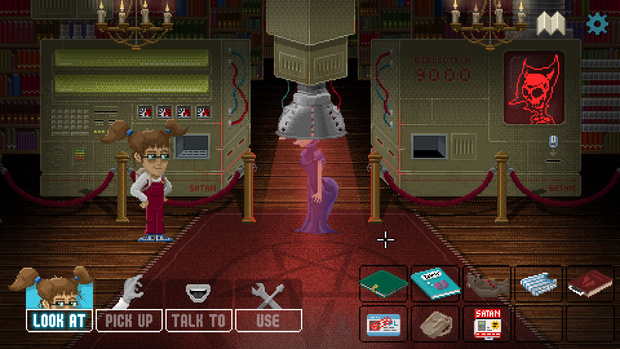
On a more personal level, how did you become interested in game design? And why adventure games in particular?
When I was eight years old, I sat down with my dad to write a text adventure game in GW-BASIC. It had two scenes, one object and absolutely zero plot to speak of. A few years later, I discovered a host of text-parser Sierra adventures and, shortly after that, LucasArts’ classics which left a lasting impression on me.
When I was eighteen, my brother gave me a copy of Macromedia Flash and, as soon as I had learned a bit of ActionScript, I tried to cobble together my own point-and-click adventure game. I very quickly came unstuck when challenged with programming wayfinding algorithms, and it took another twenty years before I was offered the opportunity to create a game for a client as part of a marketing campaign. We pitched an old-school adventure to them and they bought it, so I ended up building a web-based point-and-click engine from scratch, and writing a short game for them in just three months.
When the COVID lockdown hit the UK a year later I had a bit of free time, so I used my engine to develop a personal point-and-click game (appropriately named Lockdown) and, while promoting it on Twitter, discovered a welcoming community of indie developers keeping the genre alive. I was introduced to jams, engines, Twitch, Discord and a whole host of other game-related terms I had never heard before. I wanted to create more without being held back by my limited web programming skills, so I decided to work with a more well-established game engine, Visionaire Studio, to create a full-length adventure. That became Lucy Dreaming.
Lucy Dreaming is your first commercial adventure, but you’ve now produced several point-and-click freeware titles. What lessons did you learn from those experiences that helped you here, and did you encounter any unexpected challenges in ramping up so dramatically in size and scope (and, of course, budget)?
The whole project has been a huge learning curve. Even with some coding experience, getting to grips with a game engine has been both fun and frustrating in equal measure. The budget really helped with external services like localisation, voiceovers (for the NPCs) and music but, for the most part, the buck has stopped with me anyway. As a solo indie dev I’ve been doing the design, writing, artwork and development, and Emma and I have been doing all of the additional marketing ourselves (although that’s our day job, so we’re on relatively familiar ground there).
We took part in the AdventureX game jam in November 2020, downing tools on Lucy Dreaming for twelve days to produce another adventure, Hair of the Dog. Despite the short development time, we were able to produce a detailed, fully voiced game using all the skills I had learned over the preceding months working on Lucy Dreaming.
The scope has been the biggest difference between Lucy Dreaming and my earlier games, which all had a play time between 30-60 minutes. I naively assumed that if you want to create an eight-hour game, you need to put in eight times as much work as for a one-hour game… That is massively not the case, especially if you’re planning to release a commercial title at the end of it. Everything needed to be polished to a much higher standard and, from the display and audio settings to gamepad support, most of the behind-the-scenes set-up of the game has been completely overhauled since the demo.
Your Kickstarter was very successful, ultimately raising almost twice the original target. What was that experience like, and how have you enjoyed interacting with your community of supporters throughout the process?
Running a Kickstarter campaign was probably the hardest I’ve ever worked in my life. Bear in mind that we essentially started this whole venture from a standing start; no-one knew who we were, no-one had played our games and no-one had any reason to believe we could deliver on our intentions.

The campaign required relentless promotion for a long time leading up to launch, trying to build up followers on social media and get the game concept in front of people. This was also helped by our regular (if recently neglected) devlog, which attracted interest from adventure game fans and devs early on.
The inevitable long hours since we started have been made considerably more enjoyable by the online adventure game community. A more warm, welcoming, and supportive bunch of people you could never hope to meet. We always try to respond to every message or tweet that comes our way, and feel honoured to be part of something which means so much to so many.
In an increasingly crowded adventure game market, what in your mind makes Lucy Dreaming stand out from the rest as a must-play experience?
I suppose there are two things we are hoping will stand out for players. First, the humour. It’s quite distinctly British and sarcastic, so we’re hoping it will appeal to fans of Blackadder, Monty Python, Terry Pratchett, Douglas Adams. Second, the level of detail in the game; in Lucy’s bedroom scene alone there are eighty hotspots, each with custom responses. I personally always feel a little disappointed when I see interesting objects relegated to uninteractive scenery, and I’ve made an effort to make as much of the scenery in Lucy Dreaming interactive too. This may sound overwhelming, but we’ve found that players instinctively realise which objects are important, and we have also built in a hotspot finder that highlights all the important objects in a scene.
The game will be released on Steam and itch.io for Windows, Mac and Linux on October 18th but mobile releases are expected soon as well, correct?
Yes, the Android and iOS versions will follow shortly afterwards. We are also working on a port for Nintendo Switch, although this will likely be later next year.
We really appreciate you sharing your time with us, especially during this hectic stretch right before launch, and we wish you nothing but the best with the game. Any final words to leave with our readers?
Thank you! I’d like to remind everyone how important reviews are for small indie studios. Every review on Steam will help us to be found by more players, and will ultimately ensure our studio’s future. We’d love nothing more than to be able to produce more adventure games (we already have an idea for the next one!), so if you play an indie game, please leave a review and share it with your friends; it honestly makes a huge difference.
I also want to wish you the best of luck with Adventure Game Hotspot. I can’t wait to see what the future holds for you too.



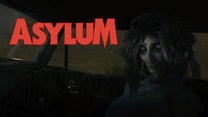
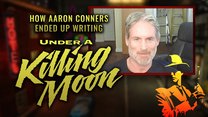
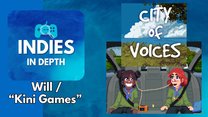
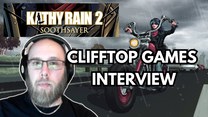
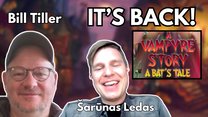
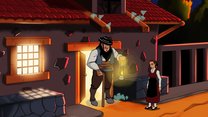

0 Comments
Want to join the discussion? Leave a comment as guest, sign in or register.
Leave a comment